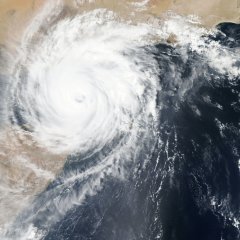World Ocean Radio - Extreme Weather

Devastating weather and water events abound worldwide, causing havoc in ports, waterfronts, and elsewhere. These are neither new nor are they going away any time soon. How do we rebuild and plan a response for a future that works, even in the face of increasingly unpredictable climate?
This week marks the 750th episode of World Ocean Radio: 15 years of weekly short audio that reaches millions around the globe, sharing concepts, demands, and solutions related to ocean technology and science, policy, examples of best practice, personal reflections, and solutions for how the ocean connects, sustains, inspires, and engages us in common history, traditions, sustenance, communication, community, and well-being. Thank you for listening!
We are aware of the key role played by insurance, more so as we face increasing events of extreme weather destruction. Government agencies are signaling policy and coverage shifts, and there is a growing realization that existing policies and programs are not adequate to the new realities. Insurance is fundamental yet largely invisible until it is not there, and may be the driving force toward necessary change for the future.
This week on World Ocean Radio we're discussing the harsh realities of 21st century storms in the face of climate change: hurricanes more powerful, more destructive, and more impactful on our ways of life. And we're asking, what will we pay if we continue to deny the realities of our climate challenges, and when will we accept responsibility for such disasters now and into the future?
This week on World Ocean Radio host Peter Neill shares observations from a recent trip to Greenland in collaboration with the Arctic Futures Institute. While visiting the four major coastal towns along the western coast, the melting glaciers that cover most of Greenland were dramatically visible. In this episode he discusses the several consequences of climate change and the rapid loss of sea ice.
This week on World Ocean Radio: a summary of fifteen new ocean challenges as identified by the conclusions of thirty conservation experts around the world, published in a July 2022 report in the journal "Nature Ecology and Evolution."
In the United States, planning and reparation for coastal flooding and damage has been administered under a National Flood Insurance Program that since 1978 has paid more than $40 billion in claims. In this episode of World Ocean Radio we outline some of the reasons why the program is not working, especially as extreme weather becomes more prevalent and levels of destruction more severe.
Natural forces unleashed an epic scale of destruction on Houston and surrounding areas of Texas. Built upon consumption, unmitigated growth, and fossil fuels, critics now point to the consequences of development based on an outdated paradigm. In this episode of World Ocean Radio, host Peter Neill asks, “What are the questions we should be asking, and what are the lessons to be learned from this catastrophe?” and he suggests a new, reorganizing principle on which to rebuild, one that redesigns in the face of a changing climate future, and one that manages growth and treats water as an asset, not an enemy.

